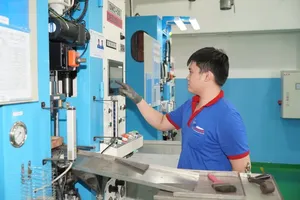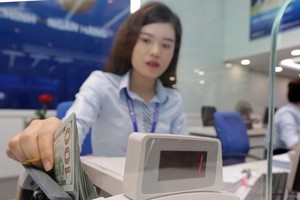 |
Illustrative image |
The State Bank of Vietnam (SBV) has been consistently reducing the operating interest rates for the fourth consecutive time in the past three months. This measure is considered an appropriate solution to achieve the objectives of lowering interest rates, boosting production, and supporting economic recovery.
Interest rates start to decline
According to the regulations set by the SBV, effective from June 19, the maximum deposit interest rate for terms less than six months will be lowered to 4.75 percent per annum, down 0.25 percentage points compared to the previous rate. Currently, commercial banks have uniformly adjusted their interest rates following this directive. In fact, it was recorded that some commercial banks have gone even further by reducing the deposit interest rates for terms of one to five months to below 4.75 percent per annum while also making adjustments to interest rates for other terms.
To provide more specific information, Agribank has reduced its interest rates for deposit terms below six months to a range of 3.4-4.1 percent per annum. For deposit terms of six months and longer and 12 months and longer, the highest interest rate offered is now 6.3 percent per annum. Another example is PVCombank, which has decreased its 6-month interest rate to 7 percent per annum and its 36-month interest rate from 8.3 percent to 7.8 percent per annum. At present, only a few commercial banks, such as ABBank, GPBank, VIB, and BacABank, maintain long-term interest rates above 8 percent.
The leader of the SBV emphasizes that the ongoing reduction of operating interest rates will set a downward trend for the market in the near future. This will provide credit institutions with a clear direction, enabling them to have more confidence and determination in reducing lending rates. However, financial experts suggest that interest rate reductions will take some time to take effect and cannot be implemented immediately. It is anticipated that by at least the third quarter of 2023 when the pressure on capital costs diminishes, banks will be able to lower lending rates.
The lag in adjusting lending rates for banks depends on factors such as their scale, capacity, capital structure, and management practices. Commercial banks also acknowledge that the current cost of borrowing remains high due to the lasting impact of the previously high interest rates on mobilized capital, particularly during the latter half of 2022.
Although adjusting lending interest rates requires a delay, the economy is benefiting from the gradual easing of monetary policy. Apart from the reduction in interest rates for the production and business sectors, many banks are also inclined towards lowering interest rates on home loans, which is positively impacting the real estate market.
Based on the latest report on the real estate market from VNDirect Securities Company, the Southern market has experienced a gradual increase in transaction volume for several projects.
Gradual decline in interest rates
Following the FED's decision to halt interest rate hikes after a series of ten consecutive increases, the SBV has continued to reduce various benchmark interest rates, marking the fourth decrease within three months. Many commercial banks have also taken proactive measures to lower deposit interest rates. Not only have they adjusted short-term deposit rates to 4.75 percent per annum as required, but several banks have gone even further by significantly reducing their rates. For instance, Agribank has lowered the interest rate for 1-2 month deposits to 3.4 percent per annum. Concurrently, lending rates have also followed a downward trajectory.
During a recent press conference, Deputy Governor of the SBV, Dao Minh Tu, disclosed that the average deposit interest rate at commercial banks currently stands at around 5.8 percent per annum, representing a decrease of 0.7 percent compared to the end of 2022. Furthermore, the average lending interest rate in Vietnamese dong is approximately 8.9 percent per annum, down by 1 percent compared to the end of 2022.
Specifically, in April 2023, the Classia Khang Dien project located in Thu Duc District, Ho Chi Minh City, had an average of approximately eight units sold per week. The De La Sol project in District 4, HCMC, saw an average of 3-4 units sold per day. The Maq project by Hongkong Land in District 1, HCMC, sold seven units in April 2023 and had an average of 2-3 units sold per week thereafter. Furthermore, the Akari City project in Binh Tan District, HCMC, recorded over 50 transactions in May 2023.
Furthermore, the capital absorption rate in neighboring provinces has been recorded at 40-60 percent, with six projects currently available for sale, resulting in a supply of 390 apartments. An expert from VNDirect Securities Company has assessed this as a positive indicator for the real estate market, considering the prevailing challenges of trust and sentiment.
Benefits for the stock market
According to many economic experts, the stock market often experiences a decline when the benchmark interest rate increases or lacks stability. Conversely, significant growth in the stock market occurs when the benchmark interest rate decreases and remains low over an extended period. Consequently, if the SBV continues to reduce the benchmark interest rate further, it will have a positive impact on the stock market's growth.
 |
Illustrative image |
For further clarification, many economists argue that high interest rates have an impact on the business performance of enterprises due to increased costs, thereby influencing investor expectations in the market. Furthermore, high interest rates also lead to a portion of funds being withdrawn from securities and redirected into the banking system.
Mr. Nguyen The Minh, Head of the Retail Research Department at Yuanta Securities Vietnam, noted that the monetary policy loosening measures implemented by the SBV consistently affect the stock market. Following interest rate cuts, the stock market becomes a favored channel for investment since the reduced attractiveness of savings deposits prompts investors to seek alternative avenues, including the stock market.
Recorded data from the stock market reveals a rapid increase in liquidity during the first half of June 2023. The market witnessed numerous trading sessions exceeding US$1 billion, playing a significant role in the recent prosperity of Vietnam's stock market. Statistics provided by securities companies also indicate that the market's upward momentum is not limited to a few exceptional trading sessions, but rather the average trading volume has continuously grown over the past four months.
Specifically, the average monthly trading volume on the HCMC Stock Exchange was around VND9.2 trillion in March 2023. It increased to nearly VND11.2 trillion in April 2023, further rising to VND12.2 trillion in May 2023. In the first half of June 2023, the average trading volume per session reached VND17.4 trillion, nearly double compared to previous months. One of the key factors driving the influx of capital into the stock market is the continuous reduction of the benchmark interest rate by the SBV since the beginning of the year. Securities companies predict an overall upward trend for the VN-Index in 2023, as the declining interest rate environment and abundant liquidity in the market contribute to its growth.
Dr. Can Van Luc, Chief Economist of BIDV:
The SBV's decision to reduce the benchmark interest rate reflects a shift in monetary policy from a cautious approach to a more flexible and accommodative stance. Specifically, the interest rate cut is expected to have a partially positive effect on the stock market and real estate sector, as investors may divert some of their savings toward stocks or real estate in pursuit of higher returns. However, the extent of this shift depends on each investor's risk tolerance, as investing in stocks and real estate entails higher risks compared to depositing savings.
Dr. Nguyen Xuan Thanh, Senior Lecturer at Fulbright University:
As of May 2023, the inflation rate is approximately 2.4 percent, which is lower than the 4 percent target set by the National Assembly at the beginning of the year. The SBV maintains a cautious approach to inflation but considers it less of a major concern. Additionally, the US Federal Reserve (FED) has temporarily paused its series of ten interest rate hikes. The USD/VND exchange rate is stable, and the SBV is actively buying US dollars to increase reserves. Vietnam's foreign exchange reserves currently stand at around $91.5 billion, and it is projected that the SBV will continue purchasing to reach $100 billion by the year's end. With stable exchange rates, low inflation, and ample liquidity, the SBV has a solid foundation to continue reducing the benchmark interest rate in the near future. However, the main pressure at present is the need to lower interest rates for businesses to stimulate credit growth. Therefore, it is anticipated that in the second half of 2023, the SBV will engage in injecting money into the economy and lowering the benchmark interest rate to support economic growth.
Despite the prevailing economic challenges, some companies in the stock market still post robust growth and offer attractive dividend yields. In particular, during May 2023, several companies declared cash dividends for the fiscal year 2022 at a rate of 30 percent (equivalent to VND3,000 per share), including Dong Nai Water Supply Construction & Services (DVW), Hung Yen Garment Corporation (HUG), IDICO Petroleum Trading Construction Investment JSC (ICN), and Vinacomin - Coal Import Export Joint Stock Company (CLM), a subsidiary of Vinacomin. Additionally, other companies disbursed cash dividends ranging from 45 percent to 50 percent, such as International Dairy Products Corporation (IDP) and Binh Minh Plastics Company (BMP).
























